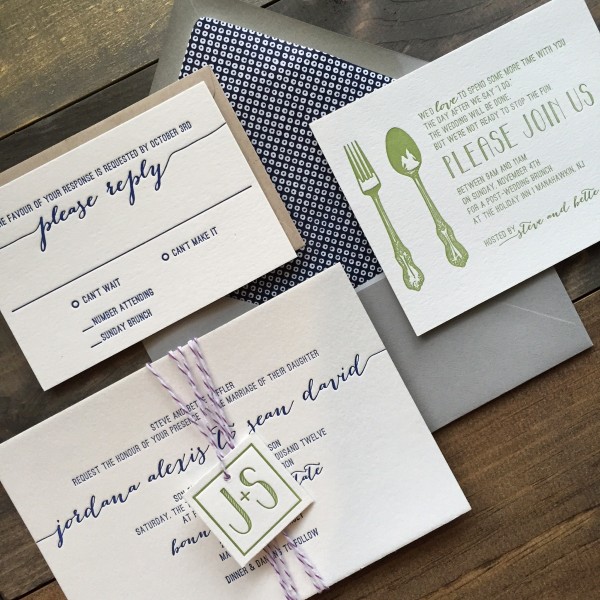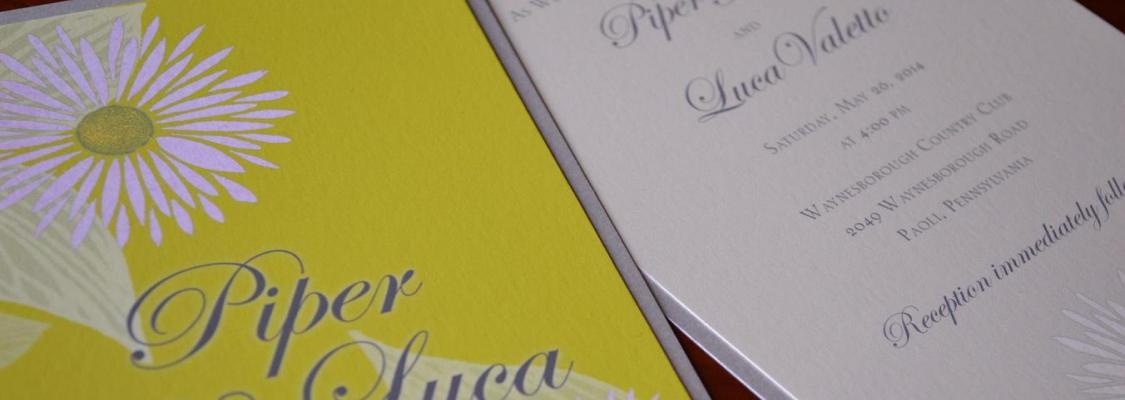Now that you have selected the perfect invitation suite to announce your wedding plans, the next step is wording. However, figuring out what to say on your wedding invitations can be almost as difficult as picking them out. With so many rules and guidelines regarding proper invitation etiquette, this aspect of the wedding planning process can be a bit overwhelming.

Photo credit: Darling + Pearl
Here are some basic guidelines to provide all of the information guests need while staying within the bounds of proper invitation protocol.
1. Do let guests know if they will be outdoors. These days, outdoor weddings in the Philadelphia area are increasing in popularity, and while most guests enjoy nature, it’s important to alert them ahead of time so that they will be able to dress accordingly. Including a brief line on an enclosure card stating that the wedding will occur on the beach or in a grassy garden will help ensure that female guests aren’t forced to navigate sand or soft earth in stilettos. It will also prompt guests who easily take a chill to prepare for that ocean breeze a light sweater. In addition, this kind of information can be crucial for guests with bad allergies or hay fever so they may know to bring medication.
2. Don’t mention gifts or your registry. This rule is generally fairly well known, but it is also an important one. Never, ever list your gift registry on your wedding invitation or enclosure cards. This is considered in very poor taste. If you are eager to let your guests know where you are registered you can always list that information on your wedding website and provide the website’s URL in your invitation suite. You can also discretely pass this information on to close friends and family and rely on them to help spread the word. Even in the event that you would prefer not to receive any gifts (or would charity donations instead), this information should not go on your invitation, either. Instead, you should once again rely on those close to you to get the message out.

Photo credit: DesignLeaf Studio
3. Do let guests know if there will be no full meal. The majority of wedding receptions in Philadelphia include some kind of meal; however, this is by no means a requirement. Therefore, since many guests may expect to eat at the reception, it’s nice to let them know if your menu is limited to hors d’oeuvres or desserts only, so that they won’t arrive with empty stomachs. Print a note on your reception card specifying that the reception is a “cocktail” or “dessert” reception so that guests aren’t confused. Also, keep in mind that if you are planning to host your reception during a time when it’s customary for people to eat a meal, you really ought to provide your guests with more than cake or finger foods if you want to make a positive impression.
4. Don’t write “Adults only” or “no children.” While it seems like a perfectly reasonable and straightforward way to let your preferences known, including an age limit in the text of your invitation suite is considered less than polite. If you’ve decided on a “no kids” policy for your big day, the proper way to indicate this is through the omission of the children’s names on the invitation’s envelope. Traditionally, only the people listed on an invitation’s envelope (whether the outer envelope or the inner one) are actually invited to attend the event. You can reinforce this by writing the names of the invited guests on the response cards and leaving off the kids. If they send you back an R.S.V.P. card with the kids’ names written in or call to let you know you’ve forgotten the little ones, then you can nicely relay that your Philadelphia wedding venue doesn’t allow children.
5. Do make sure to give an R.S.V.P. deadline. Getting people to R.S.V.P. can be like herding cats, so it’s important to give yourself every advantage when it comes to garnering responses to your invitations. Always put a clear and prominent deadline on your response cards so that invited guests know exactly how much time they have to decide whether they will attend and respond to the invitation. For formal weddings, the phrase “the favor of a reply is requested by [deadline date]” is generally used, but more relaxed language can be used for an informal event. Try to avoid simply writing “R.S.V.P. by [date],” however, as not everyone may know what that means. In general, a good choice for a deadline date would be 2-3 weeks before the wedding, to allow guests enough time to make their decisions and mail the card back to you. Generally, your caterer will need a final guest count two weeks prior to your wedding.
6. Do remember postage. Affixing postage to the response card is an important step to facilitate that ever important R.S.V.P. But with all of the steps involved, it can easily be forgotten.